
Best of Bolivia & Argentina Itinerary
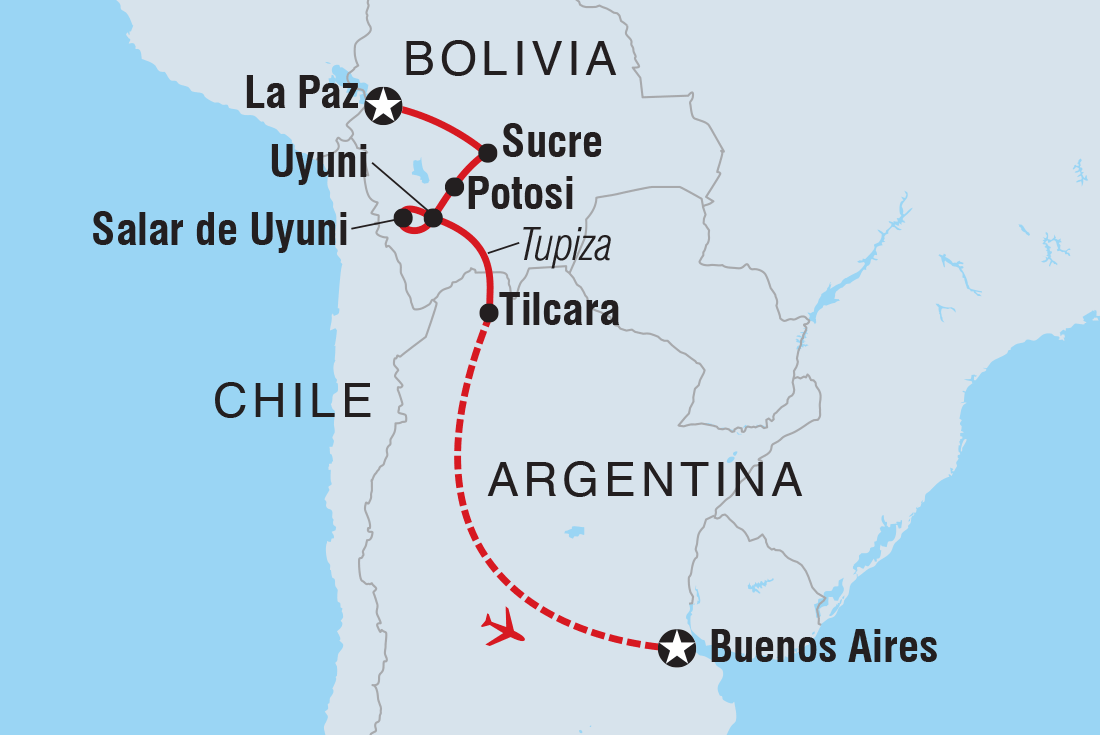


Welcome to Bolivia! Your trip begins with a welcome meeting at 6 pm. If you arrive early, feel free to explore the side streets of La Paz, or alternatively, venture out of the city in search of crisp mountain air. You could hop on a local bus out to the extraordinary landscape of Moon Valley – this maze of canyons and colossal clay spires, make for staggering views. Alternatively, why not take a cable car to the Mercado de Hechiceria (Witches Market)? Though we can’t guarantee the potions, incantations and voodoo dolls will work their magic, the experience is fascinating, and the locals will be happy to tell you about their significance. After your meeting this evening, you might like to head out with your new travel buddies for a group dinner.
Today, you’re free to discover La Paz at your own pace. Perhaps visit the Museo de la Coca, which isn’t too far from your hotel. This unusual museum delves into the history of the coca plant that grows in the region – a plant that’s played a huge role in the rise and fall of governments, and was one of the original ingredients in one of the world’s favourite soft drinks. You may also like to check out the cuisine scene in La Paz on a food tour – taste fish fresh from Lake Titicaca as well as a variety of intense flavours on a chocolate stop. Late in the afternoon, leave La Paz on an overnight bus to Sucre (approximately 11 to12 hours).
On arrival in Sucre, drop off your luggage at the hotel before heading out to explore in your own time. Bolivia’s World Heritage-listed capital is a hub of local cultures and Spanish colonial architecture. You might like to visit the Museo de la Recoleta – a 400-year-old convent which provides great views over the city and is home to a fascinating collection of sculptures and paintings. If you have time, head to the Plaza 25 de Mayo to rub shoulders with Sucre's affluent residents and check out the extravagant interior of the Senora de la Merced.
Enjoy another free day to see the sights of Sucre. Resting in a mountainous valley and overflowing with white-washed buildings and well-preserved architecture, Sucre is not only Bolivia’s official capital city, but also the most beautiful. Wander the pretty streets and snap photos of the quaint houses and medieval churches, or for something more active, hike along the pre-Inca path known as the Chataquila trek – which is mostly downhill and offers stunning views of the surrounding Andes. For something completely different, discover a prehistoric landscape and compare shoe sizes with a dinosaur at Cal Orcko, where footprints millions of years old have been preserved. This is the largest collection of dinosaur footprints in the world, with over 12,000 of them. There’s also a food culture in Sucre, so enjoy some delicious empanadas at a restaurant or a fresh juice at the Central Market.
This morning, take a local bus to the colonial mining town of Potosi (approximately 3–4 hours) – once the wealthiest city in the Americas thanks to its location at the base of silver ore-rich Cerro Rico (Rich Hill). The discovery and extraction of the silver led to a financial boom for the Spanish empire; however, the city’s riches quickly diminished and its citizens soon slipped into poverty once the silver dried up. A tour and brief history of Cerro Rico is definitely a highlight to consider here. Another place of interest is the Santa Teresa Convent Museum, where you can observe the art and treasures on display inside the convent’s original walls.
Today, leave Potosi behind and travel to the city of Uyuni (driving time approximately 3–4 hours). This remote town sits on the edge of the high Altiplano – a wilderness area extending for hundreds of kilometres towards the border with Argentina and Chile. Apart from being a gateway to the Salt Flats, Uyuni also happens to sit above the world’s largest lithium reserve of about 100 million tons! While it won’t help you if you’ve arrived with a flat battery, Uyuni’s lithium, once extracted, could potentially provide enough fuel for the entire planet’s smart phones and electric cars for the next century. Enjoy free time on arrival – perhaps take the opportunity to rest up before you kick off your exciting excursion to Salar de Uyuni tomorrow.
Depart Uyuni this morning and venture out on a three-day 4WD excursion – be prepared for a busy few days ahead. The first stop will be Cementerio de Trenes (the Train Cemetery) for an eerie look at abandoned locomotives that have been engulfed by the desert. Then, continue on to the highlight of Bolivia, Salar de Uyuni – the world’s largest salt flats. This vast desert-like landscape of blinding white salt and cactus-studded islands is the remains of a dried-up prehistoric lake. The desolate and dehydrated eco-system hosts very little wildlife, however it is home to pink flamingos. Make the most of your time on the salt flats, pose for some snaps and explore Inca Wasi – an island covered in cacti and coral-like structures.
After breakfast, hit the road through the incredible wilderness of the Andean Desert. Pass by Chiguana Salt Lake, the active Ollague Volcano and other small lakes of various colours – perhaps with a streak of pink if flamingos are nearby! Continue to the Siloli Desert – known for its seven-coloured mountain and Arbol de Piedra (Stone Tree) rock formation. You’ll also visit an Andean wildlife reserve (Reserva de Eduardo Avaroa) and hike around the Laguna Colorada (Red Lake) – keep an eye out for llamas, vicunas and foxes along the way. After a big day, head to your accommodation in a local community (either Huayllajara or Polques) for a well-earned rest and an included dinner
Rise early to try to catch the sunrise over the surrounding geysers. These bubbling fumaroles are especially active in the morning thanks to the cold air. There may also be an opportunity to visit a hot spring for an optional morning dip. After, drive through more barren landscapes – some of which are frequently compared to Salvador Dali’s paintings – to the strikingly green Laguna Verde, Valle de Rocas (Rock Valley) and the San Cristobal mining town. You’ll return to Uyuni around 5 pm to spend the night at your leisure. After a few days in the desert, you may want to check out a local restaurant with your group for an optional dinner and drinks.
Rise and shine and prepare for a long travel day as you cross the border into Argentina. Set off at 6 am from Uyuni town to La Quiaca. Arriving around 1.30 pm, cross into Argentina by foot and then jump in a taxi to the bus station. You’ll have a chance to stop briefly for lunch with your group, before jumping on another bus to Tilcara, arriving at approximately 6 pm. Nothing is planned on arrival, but if you’re not too exhausted from today’s journey, perhaps head out for dinner – your group leader will be able to point you in the right direction for a feed.
Today is a free day to explore this dusty and enchanting town. Nestled in the mountain valley of Quebrada de Humahuaca, Tilcara is one of the oldest continuously inhabited places in Argentina with an indigenous culture dating back more than 10,000 years – and the influx of tourists hasn’t stopped the age-old customs and rituals from flourishing. You might like to marvel at the pre-Inca ruins at Pucara de Tilcara, or perhaps venture out of town and check out the colourful hills of Purmamarca. If you’re keen for an authentic lunch, visit the vibrant local market, Mercado Municipal de Tilcara, to try some local street food favourites, like the traditional empanada.Your tour leader will be able to provide suggestions and help you make the best of your time here.
This morning, enjoy a relaxed morning in Tilcara before you are transferred to Jujuy for an evening flight to Buenos Aires. Fiery Latin passion, European elegance and superb cuisine combine to make Buenos Aires one of the world's most enthralling cities. You’ve got the next few days to choose your own adventure – nibble on alfajores, wander San Telmo's cobblestone streets, talk football with Portenos (people from Buenos Aires) in a cafe or get a history lesson at the quirky Museo Evita. Alternatively, you might like to walk among the tombs at the La Recoleta Cemetery – the final resting place of Eva Peron – or check out some of the great museums in the Recoleta district. Visit the neighbourhood of La Boca, home to the colourful Caminito artists’ street and world-renowned soccer team, Boca Juniors. The hottest spot in town is Palermo's Plaza Serrano, so why not head out in the evening for a tango with the locals. There are so many things to see and do in Buenos Aires, it's simply a matter of trying to fit them all in.
With no activities planned after breakfast, you are free to leave the accommodation at any time, provided you comply with the hotel’s internal check-out policies. If you would like to spend more time in Buenos Aires, be sure to ask your leader for recommendations on activities and sights in this exciting city. We’ll be happy to organise additional accommodation (subject to availability).

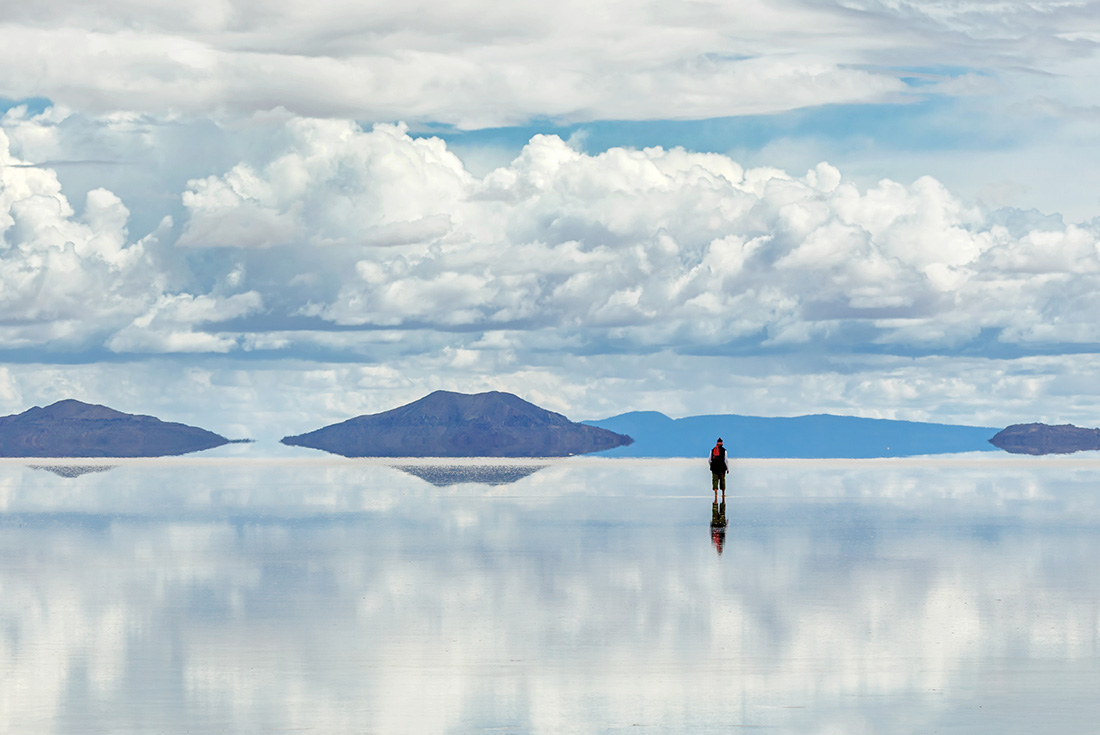
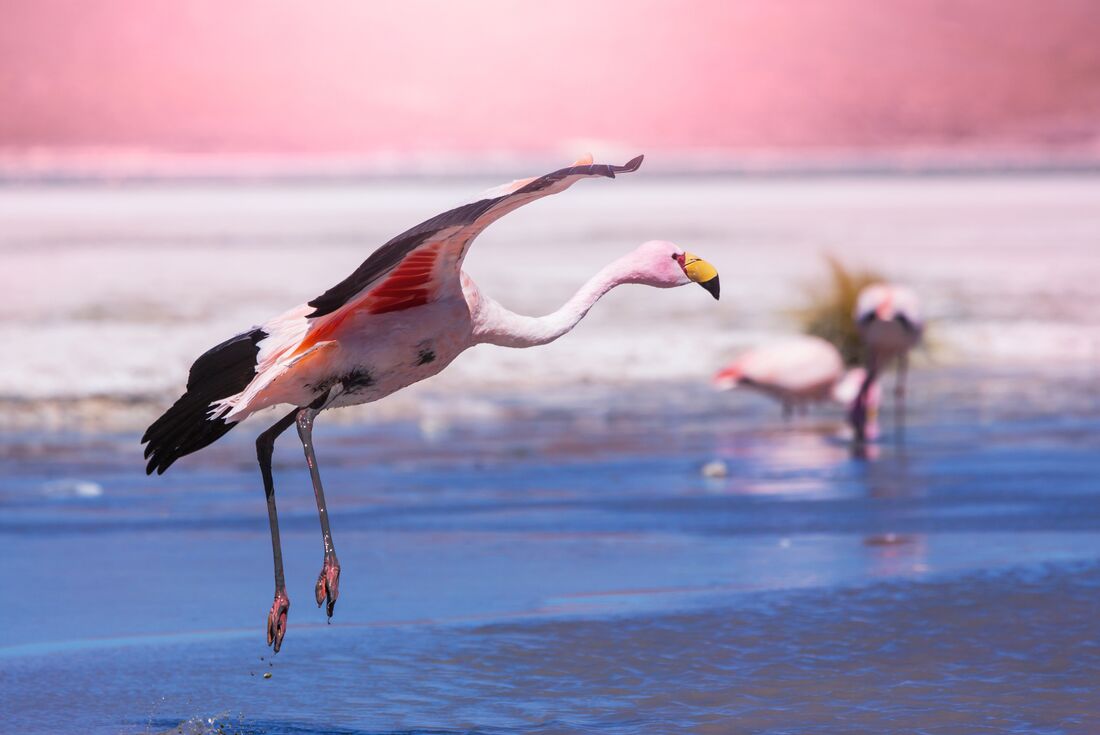
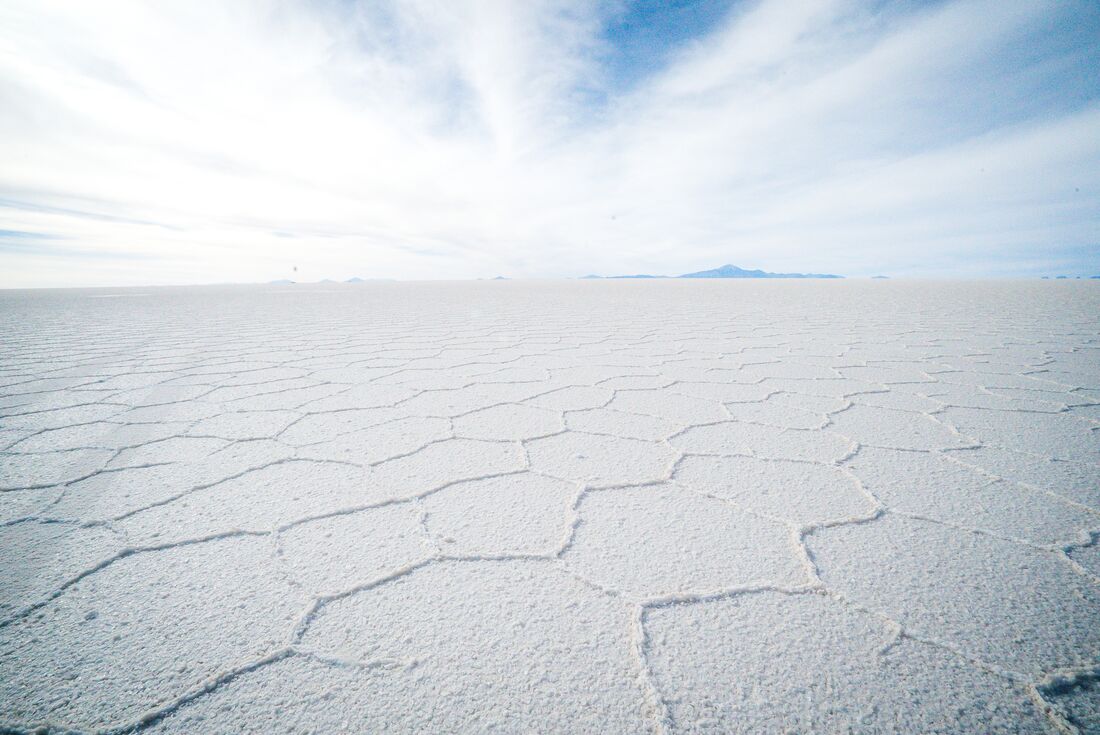
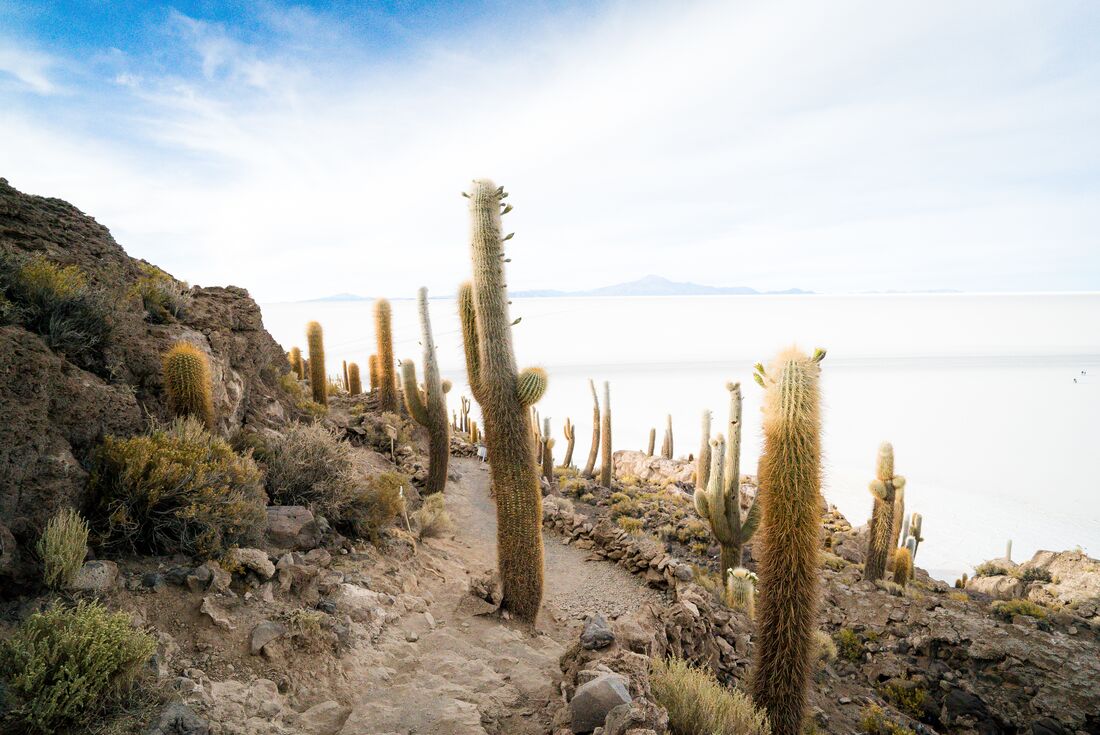
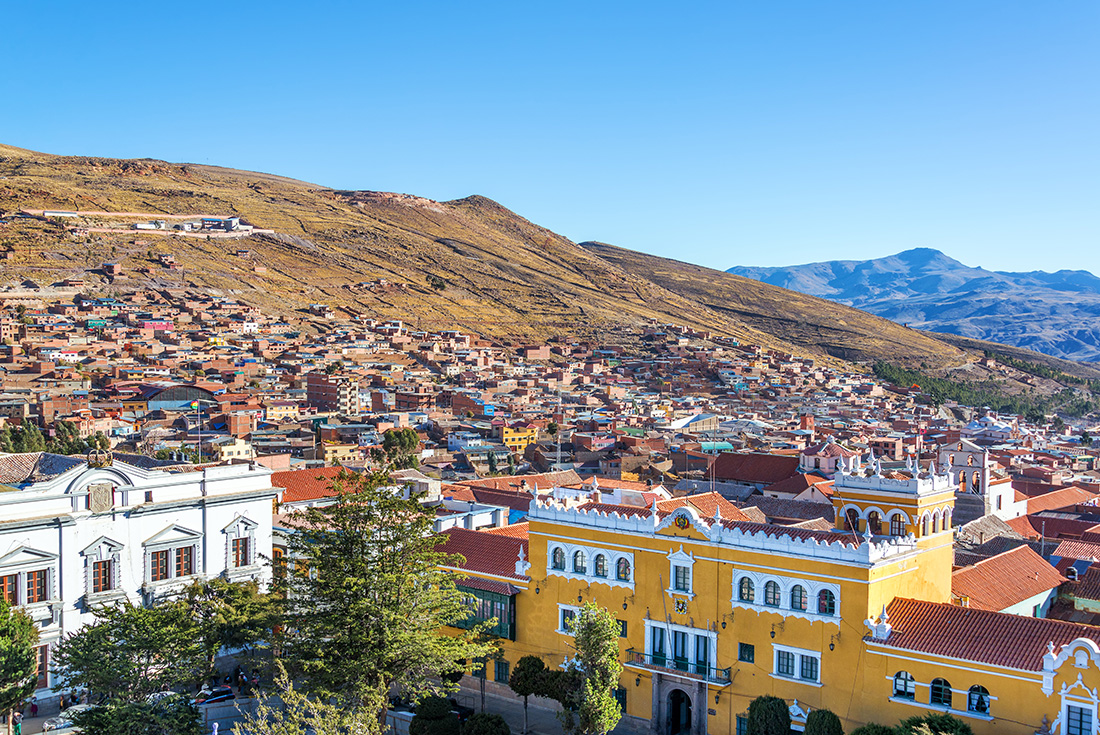
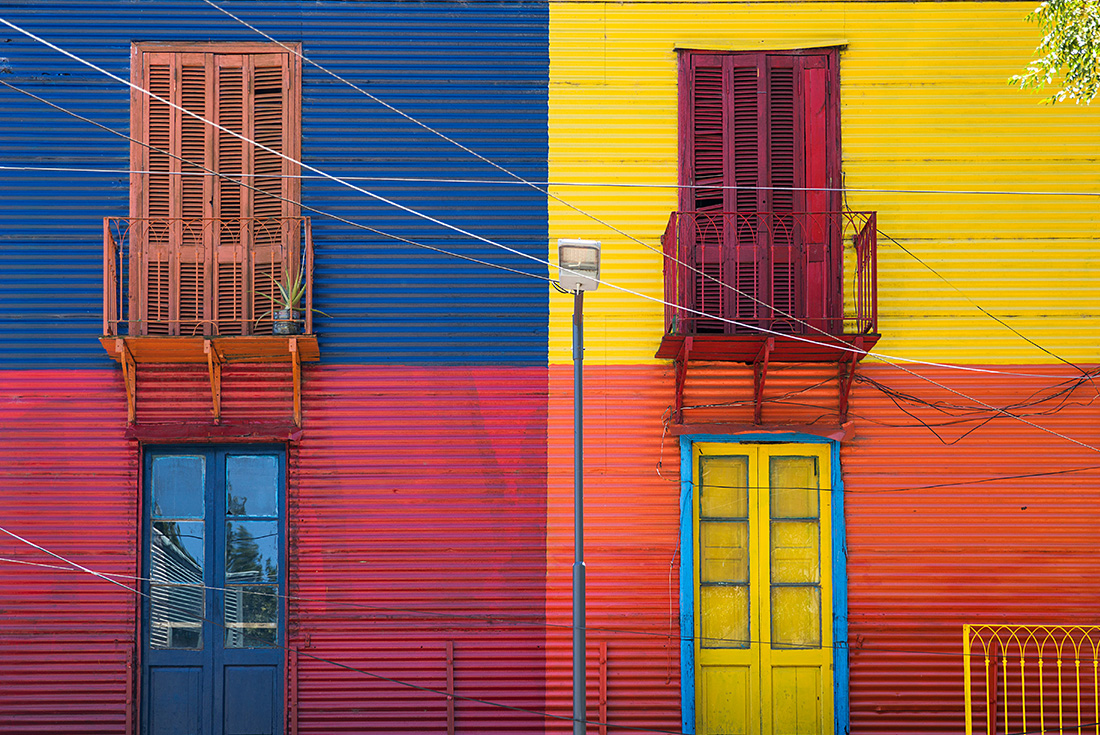
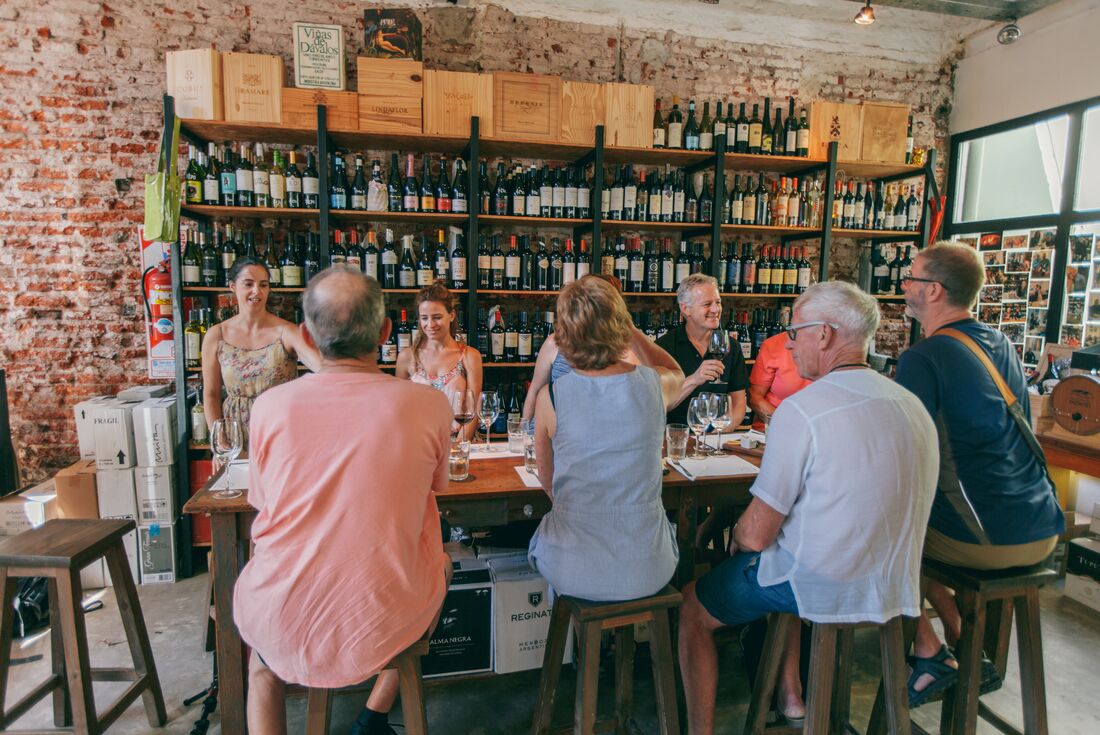
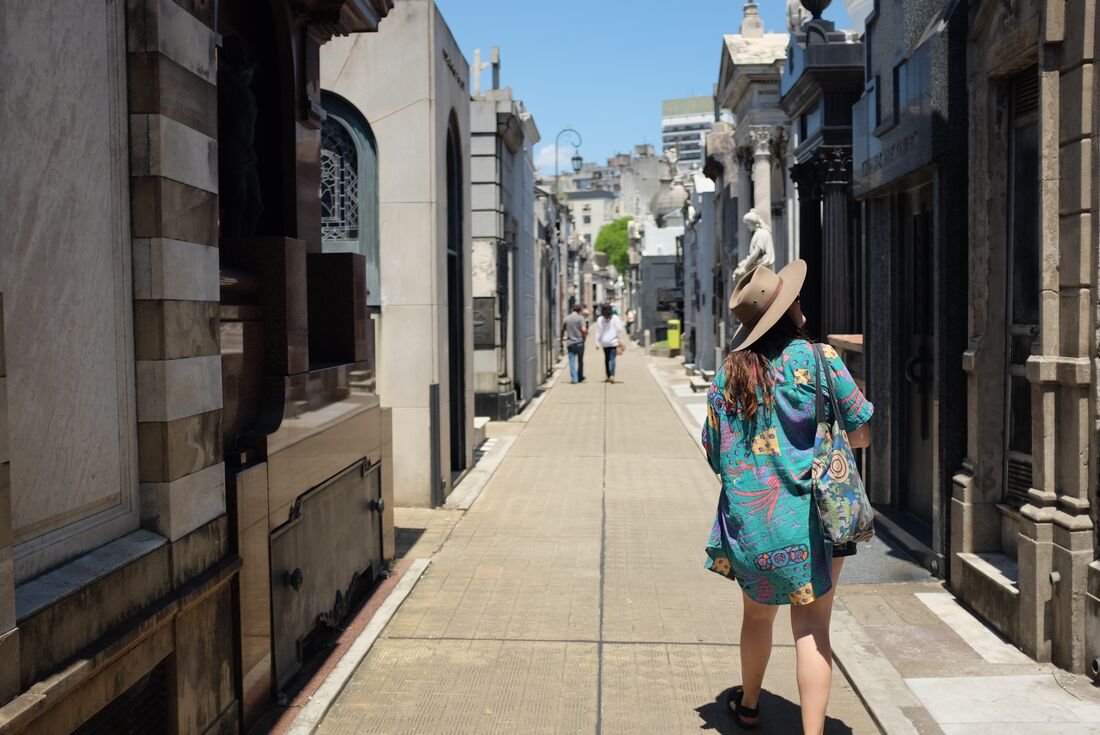
Salt flats - Visit to 'Fish Island/Inca Wasi'
Uyuni - Colchani Salt Factory Visit
Eduardo Avaroa National Reserve - Altiplano tour including Laguna Colorada
La Paz gives insight into the many sides of Bolivian culture. While young people flock to the city for its booming industry, traditionally dressed residents sell ancient potions at the Witches Market.
Elegant architecture, political history in spades and the hilly neighbourhoods dotted with terracotta roofs – Sucre might be Bolivia’s most beautiful city.
Discover the Bolivian mining town of Potosi – once a hive of activity due to its nearby abundance of silver ore, and now a historical snapshot of small-town industry.
Take an unforgettable 4WD adventure across the Salar de Uyuni – some of the largest salt lakes in the world. Pass cactus islands, train cemeteries and mineral lakes teeming with flamingos.
Get under the skin of Buenos Aires with plenty of time to explore. With its eclectic neighbourhoods, emphasis on food and wine and huge theatre scene, it’s the perfect place to travel independently.
Hotel Golden Palace, Calle Sagarnaga 531 Esq. Max Paredes , Sagarnaga, La Paz, BOLIVIA, Phone: +591 22488954, Fax: +591 22492017
Two Hotel Buenos Aires, Moreno 785 C1091AAN Cdad, Buenos Aires, ARGENTINA, Phone: +54 (11)43489700
1. This trip starts with a welcome meeting at 6pm on Day 1 in La Paz. If you are unable to find a suitable flight it is possible to book additional nights at the joining accommodation.
2. This trip ends on Day 15 and you are free to leave at any time.
3. Nationals from the United States need a visa to enter Bolivia and you we highly recommend you obtain this visa in advance from your nearest Bolivian consulate or Embassy. Not obtaining the visa in advance is likely to cause long delays at the border. Please see the visa information on these trip notes for more information.
4. Please provide your full name exactly as per passport at the time of booking (including any middle names listed on your passport) for bus tickets, train tickets or flight tickets. Fees may apply for amendments to details within 45 days of departure, and in some cases you will be required to cover the cost of issuing new tickets.
5. A single supplement is available if you’d prefer not to share a room on this trip. The single supplement exclude Day 2 (Overnight Bus) and Days 7,8 (Dormitory) where you will be in shared accommodation and is subject to availability. Please speak to your booking agent for further information.
6. Parts of your trip go above 2800 meters / 9200 feet where it is common for travelers to experience some adverse health effects due to the altitude - regardless of your age, gender and fitness. It even happened to Sir Edmund Hillary!
7. Please read the following document carefully and, during your trip, utilize the table on the back daily to record your own perspective of your general health and any symptoms you may experience: https://www.intrepidtravel.com/au/altitude-sickness
8.We highly recommend you take US Dollars with you to Argentina and change it locally. While ATMs are widely available, there is a daily limit for withdrawals and the exchange rate does fluctuate.
9. This trip includes a domestic flight within Argentina. The luggage allowance is 15kg for check in luggage. Should you wish to bring heavier luggage it is possible to increase your allowance by paying a fee at check in.
While we always endeavour to provide the best possible holiday experience, due to the nature of travel and the areas we visit sometimes things can and do go wrong. Should any issue occur while you are on your trip, it is imperative that you discuss this with your group leader or local representative straight away so that they can do their best to rectify the problem and save any potential negative impact on the rest of your trip.
We recognise that there may be times when your group leader or local representative may not be able to resolve a situation to your satisfaction - if this is the case, please ask the group leader or local representative to speak to their direct manager.
You may also choose to provide details in your online feedback, which we ask you to complete within 30 days of the end of your trip. Please do be aware that it is very difficult for us to provide any practical help after the trip is completed, so informing us while still travelling will give us the opportunity to resolve the issue in real-time., For general contact details please use the following page: https://www.intrepidtravel.com/contact-us, In case of a genuine crisis or emergency, you can reach our local office on the numbers below:
, Available for phone call or WhatsApp call on +51 996 055559 Lima, +51 940 512701 Cusco
La Paz, Potosi and Uyuni all are situated at high altitude. Even at 2900 metres above sea level, the air is a lot thinner and it can take a bit of time to adjust. Some people aren’t affected at all, but to be safe, be sure to drink plenty of water and take it easy. Although altitude sickness can affect anyone, it’s important that you’re healthy enough to travel, as pre-existing medical conditions can worsen at high altitude. During your trip, ensure you monitor your health carefully. It may even be a good idea to arrive into La Paz early so that you have time to acclimatise to the altitude. Please see the important ‘Health’ section of the Essential Trip Information for more information., Making your way across the Salar de Uyuni isn’t exactly luxurious. There will be long travel days spent in 4WDs which will likely have all seats occupied travelling on dusty and bumpy tracks. Temperatures in the area can be very cold, especially at night, so bring warm clothes with you. Meals are simple, toilet facilities are basic, showers can be cold, and the multi- share accommodation is dormitory style. This is all part of the adventure. Without a doubt, this amazing experience will be one of the highlights of your trip to South America., Bolivia is the least developed and most challenging country you’ll travel through during this trip. Facilities are basic and food might be simpler than what you’re used to. Transportation between different locations can be slow and isn’t as easy as it might be in developed countries. Yet this is all part of the ‘off-the-beaten-track’ charm and adventure that makes Bolivia such a great place to visit., There are some long travel days and an overnight bus journey on this trip. Although the buses feature comfortable reclining seats, they are not beds. There’s also usually a toilet on board, and some of the buses make toilet stops. These trips can be tiresome, but an adventure trip around South America wouldn’t be complete without an overnight bus journey.
La Paz gives insight into the many sides of Bolivian culture. While young people flock to the city for its booming industry, traditionally dressed residents sell ancient potions at the Witches Market., Elegant architecture, political history in spades and the hilly neighbourhoods dotted with terracotta roofs – Sucre might be Bolivia’s most beautiful city., Discover the Bolivian mining town of Potosi – once a hive of activity due to its nearby abundance of silver ore, and now a historical snapshot of small-town industry., Take an unforgettable 4WD adventure across the Salar de Uyuni – some of the largest salt lakes in the world. Pass cactus islands, train cemeteries and mineral lakes teeming with flamingos., Get under the skin of Buenos Aires with plenty of time to explore. With its eclectic neighbourhoods, emphasis on food and wine and huge theatre scene, it’s the perfect place to travel independently.
All group trips are accompanied by one of our group leader or local representative. The aim of the group leader or local representative is to take the hassle out of your travels and to help you have the best trip possible. Intrepid endeavours to provide the services of an experienced group leader or local representative however, due to the seasonality of travel, rare situations may arise where your group leader or local representative is new to a particular region or training other group leader or local representative.
Your group leader or local representative will provide information on the places you are travelling through, offer suggestions for things to do and see, recommend great local eating venues and introduce you to our local friends. While not being guides in the traditional sense, you can expect them to have a broad general knowledge of the places visited on the trip, including historical, cultural, religious, and social aspects. At Intrepid we aim to support local guides who have specialised knowledge of the regions we visit. If you are interested in delving deeper into the local culture at a specific site or location then your group leader or local representative can recommend a local guide service in most of the main destinations of your trip.
TRAVEL ADVISORIES & ALERTS
We recommend that you check your government's foreign travel advisory for the latest information about the destination before you travel. You will also need to ensure that your travel insurance covers you for all destinations and activities on your trip. We also recommend saving the phone number for emergency consular assistance for your government’s consulate in the destination/s you’ll be travelling. Links to travel advisories and any current travel alerts for our trips can be found here: https://www.intrepidtravel.com/travel-alerts
PERSONAL SAFETY
Ensure you have a secure method of carrying your passport, phone, credit cards and cash while travelling such as a money belt. Leave all other high value items, including jewellery, at home Use safety deposit boxes at hotels to store your valuables when available and ensure your luggage is lockable. Be aware of the risk of pick-pocketing and petty theft. Exercise caution when walking at night, don’t walk alone and stick to well-lit streets wherever possible. Be vigilant on public transport and look out for your fellow travellers. Take precautions such as carrying your bag in front of you and never leaving personal items unattended.
LGBTQIA+ TRAVELLERS
Intrepid welcomes all LGBTQIA+ customers on our trips, however we operate in parts of the world that are less accepting. We support LGBTQIA+ customers to travel to these destinations and are committed to ensuring they face no discrimination on any part of the trip we control. We recommend you visit Equaldex (https://www.equaldex.com/) and your government's foreign travel advice for LGBTQIA+ travellers when choosing your trip., https://www.intrepidtravel.com/safety-guidelines, PETTY THEFT AND PERSONAL SAFETY
While travelling there is always the risk of pick-pocketing and petty theft, particularly in the more touristy cities. We recommend that you exercise caution when walking alone at night and encourage you to walk together and only on main, well-lit thoroughfares. Be particularly vigilant on public transport. Simple measures like carrying your day pack on your front, not hanging your bag over the back of your chair or on the floor and wearing a money belt will reduce any chance that your valuables should go missing., MONEY WITHDRAWAL:
In order to avoid fraud and theft, it is advisable that you withdraw money from ATMs located inside banks or guarded shops during business hours only., FIRE PRECAUTIONS
Local laws governing tourism facilities in this region may differ from those in your home country and accommodation we use may not have a fire exit, fire extinguishers or smoke alarms., SEAT BELTS:
Please be aware that local laws governing transportation safety may differ from those in your home country and not all the transport which we use is able to provide seat belts., TRAFFIC AND DRIVING ON THE OTHER SIDE OF THE ROAD:
Depending on where you come from please note that drivers in this part of the world may drive on the opposite side of the road from what you are used to. Look both ways before crossing any road. Traffic can be a little more chaotic than you might be used to at home. Be aware!
PASSPORT
You’ll need a valid passport to travel internationally and most countries require your passport to have a minimum of 6 months validity, so remember to check the expiry date.
We need your passport information to get everything ready for your trip so it’s important that the information on your booking matches your passport exactly. Please take care to provide the correct details. We recommend carrying a copy of the photo page of your passport while travelling and leaving a copy at home with family or friends.
VISAS & ENTRY REQUIREMENTS
Many countries require a visa and obtaining the correct visa for your trip and any countries you may transit through is your responsibility. We recommend you check your visa requirements as soon as you have booked your trip. This will ensure you have time to prepare your documents and for your visa application to be processed. You can check the entry requirements for your nationality on your government's foreign travel advisories, consular websites or on our page here: www.intrepidtravel.com/visa-entry-requirements
Information not available.
Validity: 01 Jan 2026 to 31 Dec 2026
GENERAL HEALTH
All travellers need to be in good physical health in order to participate fully on this trip. For the safety and wellbeing of yourself and others, if you are unwell prior to travelling, please stay at home and contact us to make alternative arrangements.
When selecting your trip please make sure you have read through the itinerary carefully and assess your ability to manage and enjoy our style of travel. Please note that if in the assessment of our group leader or local representative a traveller is unable to complete the itinerary without undue risk to themselves and/or the rest of the group, we reserve the right to exclude them from all or part of a trip without refund.
You should consult your doctor for up-to-date medical travel information or for any necessary vaccinations before departure. We recommend that you carry a first aid kit as well as any personal medical requirements in their original packaging as they may not easily be obtained while travelling. If you are carrying medication, ensure you check your government's foreign travel advice for any local restrictions or requirements.
, ALTITUDE SICKNESS
This trip travels to altitudes where there is a risk of Acute Mountain Sickness (AMS), a potentially life-threatening condition if left untreated. AMS can affect anyone, regardless of age, fitness or experience. There is a higher risk of AMS for those who have had it before, those who drink alcohol and those who take part in strenuous exercise before correctly acclimatising.
As some medical conditions or medications may increase your susceptibility, we strongly advise discussing any pre-existing conditions, your participation in this trip, and preventative medications such as Diamox with your doctor.
Our itineraries are carefully designed and risk-assessed in line with our Altitude Safety Policy and current best practice standards for safe acclimatisation. However, AMS can still occur, and it’s essential to be aware of the signs and symptoms. These include nausea, dizziness, shortness of breath and headaches.
Our experienced leaders are trained in AMS awareness and first aid and will conduct regular checks to help you monitor your health throughout the trip. They have full authority to make decisions regarding your participation based on medical needs or AMS symptoms, including delaying or stopping your ascent if necessary.
More information about Altitude Sickness can be found here: https://www.intrepidtravel.com/au/altitude-sickness
, YELLOW FEVER
A valid international certificate of vaccination against Yellow Fever is required in many countries. You may need to present this on arrival at the airport or border crossing. Some countries will refuse entry if you are unable to present your certificate. It's also quite common for your home country to request a Yellow Fever certificate on your arrival back home. It is your responsibility to check with your doctor well in advance of leaving home about the Yellow Fever requirements for the countries you'll be visiting.
, MOSQUITO-BORNE ILLNESSES:
Some regions of Central & South America can experience outbreaks of dengue fever. There is no vaccination against it, but there are preventative measures that you can take such as wearing long clothing, using repellent, and being indoors particularly around dusk and dawn. If you have a fever or feel unwell, please let your group leader or local representative know right away. Protect yourself against mosquito-borne illnesses such as malaria by taking measures to avoid insect bites., DENGUE FEVER:
Dengue Fever is common in Latin America and can occur throughout the year. Argentina, Bolivia, Uruguay, Brazil, and parts of Mexico are currently suffering from a serious outbreak. This virus is transmitted by mosquitoes. There is no vaccination against it, but there are preventative measures that you can take such as wearing long clothing, using repellent, and being indoors particularly around dusk and dawn., ZIKA VIRUS:
There have been reports of transmission of the mosquito-borne Zika virus in this region and we advise all travellers to protect themselves from mosquito bites. Given possible transmission of the disease to unborn babies, and taking a very cautious approach, we recommend all women who are pregnant or trying to get pregnant to consult with their doctors before booking their trip.
While travelling with us you'll experience the vast array of wonderful food available in this region. Your group leader or local representative will be able to suggest restaurants to try during your trip. To give you the maximum flexibility in deciding where, what and with whom to eat, generally not all meals are included in the trip price. This also gives you more budgeting flexibility. As a rule, our groups tend to eat dinner together to enable you to taste a larger variety of dishes and enjoy each other's company. There's no obligation to do this though.
DIETARY REQUIREMENTS
Please let us know your diet requirements before your trip starts.
Generally speaking, in bigger cities/towns vegetarians can expect a reasonable range of vegetarian venues and/or vegetarian options within tourist restaurant menus. However, vegetarianism is not the norm in this part of the world so options can be limited when eating at homestays, small local restaurants, street stalls, markets, etc.
More restrictive diet requirements (vegans, coeliac, gluten intolerance, fructose intolerance, lactose intolerance, etc.) can also be accommodated along this trip but you should expect a lesser variety than what you can expect at home. We recommend that, if possible, to bring your own supply of snacks with you.
For those on strict Kosher or Halal diets, we understand your dietary requirements are important, however, sometimes due to cultural and language differences these are not always easy to convey when you are travelling. Your guide will do their best to assist you in translating your needs when eating out, but please be aware that these diets are almost unheard of in much of the continent and the best they may be able to accommodate is no pork and shellfish. If this will be a concern for you you may need to consider opting for vegetarian or vegan meals for the included meals in your itinerary. We recommend researching kosher or halal options in your destination country prior to travel to see if you are able to buy snacks once there, otherwise consider bringing some from home.
SPENDING MONEY
When it comes to spending money on the trip, every traveller is a little different. You know your spending habits better than we do, so please budget an appropriate amount for things like optional meals, drinks, shopping, optional activities, and laundry. Make sure you have read the itinerary and inclusions thoroughly so you know what is included in the trip price and what you may need to pay for while travelling. , CREDIT CARDS, ATMS AND EXCHANGING MONEY
ATMs are widely available in major towns and cities across South America. Credit cards are generally accepted in tourist shops and some restaurants across South America. Visa and Mastercard are preferred. Smaller shops and restaurants only accept cash.
USD cash is the easiest to exchange. We recommend bringing large bills in good condition, 2013 series onwards only. Any old or damaged notes may not be accepted., ARGENTINA
We strongly recommend you take USD cash with you to Argentina and change it locally to Argentinian Pesos (ARS). While ATMs are widely available, there is a daily limit for withdrawals and the exchange rate fluctuates.
, TIPPING
Tipping can be an appropriate way to recognise great service when travelling. While it may not be customary in your home country, it is an entrenched feature of the tourism industry across many of our destinations and is greatly appreciated by the people who take care of you during your travels. It is always best to avoid tipping with coins, very small denomination notes, or dirty and ripped notes, as this can be regarded as an insult rather than the goodwill gesture it is intended to be., OPTIONAL TIPPING KITTY
On Day 1 of your trip, your group leader or local representative may discuss with you the idea of operating a group tipping kitty, whereby everybody contributes an equal amount and your group leader or local representative distributes tips for drivers, local guides, hotel staff and other services included on your trip. Participation in this kitty is your choice, and you are welcome to manage your own tipping separately if you prefer.
The group leader or local representative will keep a running record of all monies spent, which can be checked at any time. Any funds remaining at the end of the trip will be returned to group members. These tips to suppliers are for great service and are in addition to the regular costs paid for the services supplied.
The tipping kitty excludes tips for your group leader or local representative., Optional tipping kitty for this trip: USD 28 per person., YOUR GROUP LEADER OR LOCAL REPRESENTATIVE
Tipping your group leader or local representative is highly appreciated if you feel they’ve provided outstanding services throughout your trip. The amount is entirely a personal preference; however, as a guideline, the recommended amount is 4-7 USD or EUR per traveller per day (in a currency relevant to your destination). Of course, you are free to tip more or less as you see fit, depending on your perception of service quality and the length and involvement of your group leader or local representative on your trip., CONTINGENCY FUNDS
We try to plan for every eventuality, but there are still some things beyond our control. We reserve the right to change an itinerary after departure due to local circumstances or a Force Majeure Event. In such emergency circumstances, the additional cost of any necessary itinerary alterations will be covered by you. Please note we are not responsible for any incidental expenses that may be incurred as a result of the change of itineraries including but not limited to visas, vaccinations or non-refundable flights. Make sure you have access to an extra US$500 for emergencies (e.g. severe weather, natural disasters, civil unrest) or other events that result in unavoidable changes to the itinerary (e.g. transport strikes or cancellations, airport closures). Sometimes these things necessitate last-minute changes to enable our trips to continue to run, and as a result, there may be some extra costs involved. The recommended amount is listed in USD for the relatability of universal travellers, however, local currency may be needed once in the country to cover these costs.
Most travellers prefer to take a small to medium wheeled suitcase or a medium to large backpack, which is a great size for the packing capacity in our vehicles. Whatever you take, be mindful that you will need to be able to carry your own luggage, handle it at airports, take in/out of accommodation and perhaps even walk short distances. Generally speaking, we recommend you pack as lightly as possible. You'll also need a day pack/bag for activities and day trips.
Airlines generally allow a maximum of 15kg to 20kg for check in luggage. In addition, flights in Peru will allow 1 piece of small hand luggage for carry on only (maximum dimensions allowed for carry on: 25cm depth x 35cm width x 45 cm height). Domestic flights within Argentina allowance is 15kg for check in luggage, should you wish to bring heavier luggage it is possible to increase your allowance by paying a fee at check in.
Other than the items and clothing you always need on a trip, below we have listed packing suggestions specific for this trip:
RECOMMENDED:
- Soft and/or hard copies of all important documents e.g. air tickets, passport, vaccination certificate, etc. and keep the hard copies separate from the originals. While not valid, a copy makes it very much easier to obtain replacements if necessary
- Water bottle. We recommend at least a 1.5 litre capacity. The sale of bottled water contributes to an enormous environmental problem around the world. In addition to the water in bottles, the production of a 1 litre plastic bottle takes 2 litres of water and 200ml of oil. A large proportion end up in limited landfill or discarded in waterways and natural environments
- Electrical adapter plug.
- Personal medical kit. Your guide will carry a large kit but we recommend you carry items such as mild pain killers, electrolytes and band-aids.
- Insect repellent
- Watch/Alarm clock or phone that can be used for both
- Swimwear
-Sleeping bag: Night time temperatures are often well into the minuses it can often get as cold as -5 degrees. Blankets are provided however due to the extreme weather conditions we strongly recommend that you either rent or bring your own sleeping bag.
Sleeping bags can be rented in Uyuni for the 3-day tour for about 10 USD (total cost, not per day).
- Warm clothes: Thermal underclothes, being small and light, a light water and windproof jacket
-Travel Towel: We recommend bringing a travel towel for the Uyuni part of this trip as we can't always guarantee towels will be provided at your stay in the basic accommodation.
OPTIONAL:
- Ear plugs to guard against a potential snoring room-mate
- Phrase book
VALUABLES:
Please try to avoid bringing unnecessary valuables, and use your hotel safe. It’s also a good idea to purchase a money belt or pouch that is easily hidden.
LAUNDRY
Laundry is available at many hotels and towns during this trip, although you might need to wait for a two-night stop in order to make sure you get it back in time. While laundry at hotels is usually charged by the item, laundromats usually charge by the kilo, which is generally inexpensive (about USD 2 per kilo)
ESSENTIAL:
- Closed-in shoes will help to protect your feet from cuts and scratches when walking through cities as well as bush/grass-lands, and will also act as a barrier protection in rare cases against bites or stings
- Sun protection - hat, sunscreen, sunglasses.
- Day Pack - A day bag that has easy access to water bottles (external side pockets) or a day pack with a built in hydration bladder. This bag only needs to be large enough to hold the few things you need during the day (hat, water, camera, snacks, rain jacket etc)
- Waterproof, well worn-in walking boots - Good quality, comfortable footwear is essential. Whatever you wear on your feet the most important thing is comfort. It is vital to ensure your boots are well worn in and lightweight. Ankle support and waterproofing is recommended but if you already have something comfortable with good grip on rocks then don’t go rushing out to buy new boots – you are better off with your well-worn in pair!
- Walking clothing - Its best to bring clothes that can be layered so you can adjust layers according to the weather which is ever-changing in the Falklands. Please ensure this includes a waterproof jacket and pants.
-Basic personal toiletries
Information not available.
Intrepid won't tolerate any kind of violence, harassment (whether physical, verbal or sexual), or disrespect toward fellow travellers, our teams or local communities.
To ensure the wellbeing of everyone on the trip, decisions made by your group leader are final.
Romantic relationships between travellers and group leader or local representative are not permitted while on trip.
Any behaviour that prevents your leader from continuing the itinerary as planned, breaks local laws or opposes any of these guidelines may result in Intrepid denying your booking or removing you from the trip.
If something concerns you during your travels, please speak to your group leader immediately. Alternatively, you can contact us on the emergency contact number detailed in the Problems and Emergency Contact Information section of this Essential Trip Information.
The style of accommodation indicated in the day-to-day itinerary is a guideline only and may change. On some occasions, alternative arrangements may need to be made due to the lack of availability of rooms in our preferred accommodation. In these cases, we will use a similar standard of accommodation.
Throughout the trip, we request that our properties prepare rooms in time for our arrival, especially if we're arriving prior to normal check-in time. However, this isn't always possible which means we won't be able to check-in immediately on arrival at some hotels. Instead, we can store our luggage and explore our new destination or on some trips, have use of shared day rooms until all rooms are available.
Overnight buses have reclinable seats - usually more comfortable than your average economy plane seats. You may be offered a simple dinner on board or stop at a service station to buy snacks and drinks. Before boarding an overnight bus, it's always a good idea to have music, a book, water, snacks and warm clothing ready.
Travel insurance is compulsory on all our trips for those travelling internationally. We require that, at a minimum, you are covered for medical expenses, including emergency repatriation. If you are travelling within your home country or region, please confirm before travel that you are entitled to access the public medical system easily should an accident occur. We strongly recommend all travellers have a policy that also covers personal liability, cancellation, curtailment and loss of luggage or personal effects. For international trips, you will not be permitted to join the group until evidence of travel insurance and the insurance company's 24-hour emergency contact number has been sighted by your group leader or local representative.
If you have credit card insurance, your group leader or local representative will require details of the participating insurer/underwriter, the level of coverage, policy number, and emergency contact number, rather than the bank's name and your credit card details. Please contact your bank for these details prior to arriving in-country.
For travellers who reside within the European Union, Switzerland or the USA, the requirement to purchase travel insurance cannot be compulsory. However, the purchase of travel insurance is still highly recommended, and each country you visit may have its own specific entry requirements. For example, some mandate travel health insurance for all foreign travellers, regardless of their nationality. Travellers from the European Union, Switzerland or the USA who decline travel insurance when travelling outside their home region must sign a Travel Insurance Waiver Form at the Group Meeting, recognizing personal responsibility for emergency medical and repatriation costs should they arise.
For assistance with travel insurance or other services, please visit the link below:
, https://www.intrepidtravel.com/booking-resources/our-services
As you travel on a group trip you will be exposed to all the pleasures and maybe some of the frustrations of travelling in a group. Your fellow travellers will probably come from all corners of the world and likely a range of age groups too. We ask you to be understanding of the various needs and preferences of your group - patience with your fellow travellers is sometimes required for the benefit of everyone's travel experience. Remember too that you have responsibilities to the group. If you are requested to be at a place at a certain time, ensure that you don't keep the rest of the group waiting. We have found time and time again that the very best trips we operate are those where the dynamics within the group work well - this takes just a little effort on your part. Due to privacy reasons, we are unable to provide you with contact details and any personal information about your fellow travellers booked on your trip prior to departure., SOLO TRAVELLERS
On our trips, rooming is organised on a twin-share basis. We pair up solo travellers with another traveller of the same gender, as per the gender marker on each of their passports.
We also offer an optional single supplement on most trips for travellers who prefer to have their own room. This only applies to accommodation during the tour. Pre-trip and post-trip accommodation booked through us will always be on a single-room basis.
On a small selection of trips some accommodation will be open-gender and multishare, such as a felucca in Egypt or an overnight train in Vietnam. Please review the Accommodation section of the Essential Trip Information for details about your trip.
LGBTQIA+ TRAVELLERS
We strive to create a safe and inclusive environment for everyone. If your gender identity differs from what is indicated on your passport, please contact us so that we can discuss rooming options with you.
ITINERARY CHANGES
Our itineraries are updated regularly throughout the year based on customer feedback and to reflect the current situation in each destination. The information included in this Essential Trip Information may therefore differ from when you first booked your trip. It's important that you review this information prior to travel so that you have the latest updates. Due to weather, local conditions, transport schedules, public holidays, political unrest or other factors, further changes may be necessary to your itinerary once in-country. Your group leader or local representative will keep you up to date with any such changes once your trip is underway and has the authority to amend or cancel any part of the trip itinerary if deemed necessary due to safety concerns.
, OPTIONAL ACTIVITIES
A selection of optional activities that have been popular with past travellers are listed in the day-to-day itinerary. This isn't an exhaustive list and should be used as a guide only for some of what might be available. Prices are approximate, are for entrance fees only, and don’t include transport to and from the sites or local guides unless indicated. All activities are subject to availability, and maybe on a join-in basis. It may not be possible to do all the activities listed in the time available at each destination, so some pre-planning for what you are most interested in is advised. When it's recommended that travellers pre-book these activities, look for a note in the Special Information section of the day-to-day itinerary. For most, they can either be organised independently on the day, or let your group leader or local representative know you are interested at the Welcome Meeting and they can assist.
Where activities are considered medium or high risk, we work with operators whose safety and credentials we have sighted and assessed. Although it is possible that you may find the same activity cheaper with another operator on the ground, we cannot vouch for the safety or quality of that operator. Medium and high-risk activities not listed above have not been assessed by us and as such our staff and group leader or local representative are unable to assist you with organising these activities. Activities that contravene our Responsible Travel policies are also not listed. Please remember that the decision to partake in any activity not listed is at your own discretion and risk.